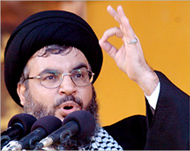Arab-Latin summit motive questioned
The first ever summit between South American and Arab leaders in Brazil next week is intended to boost trade and investment but has already prompted US concern it will become a platform to attack its Middle East policy.

Brazil, South America’s biggest economy which like much of the continent has strong Arab immigrant ties, proposed the summit as part of a drive to be a diplomatic power in a region that has turned politically to the left in recent years.
The gathering of leaders from 11 South American countries and 22 Arab states is billed as a means to reduce dependence on the United States and Europe and strengthen alliances in forums like the World Trade Organisation and United Nations.
But Arab nations have pushed issues such as terrorism, Iraq and Palestine on to the agenda, according to diplomatic sources.
Relations strained
A summit declaration, to be released on 11 May, could strain relations between South America and the US if it is seen to tacitly back groups, including Lebanon’s Hizb Allah, that Washington classifies as terrorist organisations.
|
| ||||
A draft copy of the declaration published in the Brazilian press raised expectations the meeting would criticise US and Israeli use of force and back the rights of peoples to resist occupation.
 |
|
The summit declaration may |
“The positions and worries of Israel regarding the summit have been expressed directly to the government of Brazil and other South American governments,” the Israeli embassy in Brazil said in a statement.
“We have made our concerns known to the Brazilian government about the importance of not doing anything to undermine the world’s shared goal of peace in the Middle East,” a US government official said.
The US embassy in Brazil declined to comment.
‘Nothing frightening’
Brazil has said the motivation behind the summit is Arab-South American ties dating back more than 500 years. Some of the first sailors to land in the Americas off Spanish ships were exiled Moors.
“Obviously the positions these countries take won’t please everyone,” Vera Pedrosa, political under-secretary at Brazil’s Foreign Ministry and who helped draft the summit declaration, said.
 |
|
Rice says the summit’s message |
But Pedrosa added: “There is nothing frightening about this meeting for any country, no one is going to invent a new solution (for Middle East problems).”
Arab representatives have denied the summit has an anti-US or Israeli goal.
“We are against the policies of Israel, not against Israel itself,” secretary-general of the Arab League Amr Moussa said during a visit to the Brazilian capital Brasilia last month to plan the gathering.
“The meeting isn’t against anyone.”
Israeli visit
On a visit to Brasilia on Monday, Israel’s Vice-Defence Minister Zeev Boim told Brazilian officials that the Middle East peace process needed the summit’s support rather than more criticism.
An informal request by Washington to observe the summit was turned down. Brazil’s foreign ministry told the Americans the meeting was public and they could watch it on television.
US Secretary of State Condoleezza Rice, in Brazil last week, said the “message” the summit sent was important to reform in the Arab world and progress in a US-devised road map plan for Palestinian statehood.
About 10 million Brazilians today claim Arab ancestry in the country of 180 million people. Colombia, Argentina, Ecuador and Honduras have signifcant Arab populations that have produced pop star Shakira and leaders such as Argentina’s former president, Carlos Menem, and Ecuador’s ex-president, Abdala Bucaram.
Political analyst Peter Hakim said support by South American nations for Middle East groups resisting occupation could be interpreted as symbolic support for terrorism in Washington.
“To wade into an issue that everyone realises is tremendously sensitive for the United States just seems like a mistake,” said Hakim, president of the Inter-American Dialogue think-tank in Washington.